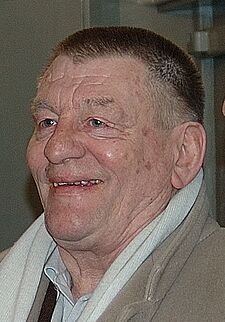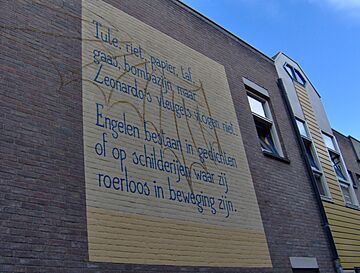J. Bernlef facts for kids
Quick facts for kids
J. Bernlef
|
|
|---|---|

Bernlef in 2008
|
|
| Born | Hendrik Jan Marsman 14 January 1937 Sint Pancras, Netherlands |
| Died | 29 October 2012 (aged 75) Amsterdam, Netherlands |
| Pen name | J. Bernlef, Ronnie Appelman, J. Grauw, Cas den Haan, S. den Haan, and Cas de Vries |
| Occupation | Novelist, poet, translator |
| Language | Dutch |
| Nationality | Dutch |
| Notable awards | Constantijn Huygens Prize (1984) P. C. Hooft Award (1994) |
| Spouse | Eva Hoornik (1960–2012; his death) |
Hendrik Jan Marsman (born January 14, 1937 – died October 29, 2012) was a famous Dutch writer. He was better known by his pen name, J. Bernlef. He wrote many books, poems, and even translated works from other languages. A lot of his writing explored how people see and understand the world around them. Bernlef won many important awards for his work, like the Constantijn Huygens Prize in 1984 and the P. C. Hooft Award in 1994. His book Hersenschimmen is considered one of the best Dutch novels ever written.
Contents
Life of J. Bernlef
Early Life and Pseudonyms
Hendrik Jan Marsman was born on January 14, 1937, in Sint Pancras, Netherlands. He wrote in many different styles and used several pen names. These included Ronnie Appelman, J. Grauw, Cas den Haan, S. den Haan, and Cas de Vries. He chose "J. Bernlef" as his main pen name because there was already a well-known Dutch poet named Hendrik Marsman. Bernlef didn't want to be confused with him. He picked the name of an 8th-century blind Frisian poet named Bernlef.
Key Moments and Creative Beginnings
The year 1958 was very important for Bernlef. He spent some time in Sweden, which later helped him translate books by Swedish writers. He also helped edit an English magazine called A pulp magazine for the dead generation. He worked on this with the Beat poet Gregory Corso.
Around the same time, Bernlef visited a Dada art exhibition. This inspired him and two other poets, K. Schippers and G. Brands. Together, they started an important magazine called Barbarber, which was published from 1958 to 1971.
Family and Success
In 1960, Bernlef's first collection of poems, Kokkels (meaning "Cockles"), won an award. That same year, he married Eva Hoornik. She was the daughter of another poet, Ed. Hoornik. Bernlef and Eva had two children together. His friend Schippers married Eva's twin sister, Erica.
Later, Bernlef started writing novels. He became very famous for his book Hersenschimmen in 1984. This book was translated into English as Out of Mind. He was a very busy writer. Shortly before he passed away, a photo showed a stack of his books that was as tall as he was!
Later Years and Legacy
Bernlef died on October 29, 2012, at the age of 75, at his home in Amsterdam. He had been ill for a short time. Many people praised him after his death. One tribute called him "one of the greats of Dutch literature."
Sara Whyatt from PEN International said that Bernlef was not only a great writer but also a strong supporter of other writers. In the late 1980s, he became the director of The PEN Emergency Fund. This fund helps writers and their families who have faced prison, threats, torture, or censorship. Bernlef worked very hard to help them.
J. Bernlef's Works
Exploring Reality with Barbarber
The magazine Barbarber, which Bernlef and his friends started in 1958, first came out with only 100 copies. It was full of Neo-Dadaist ideas, which meant it used everyday objects and images in new, surprising ways. It featured both word and picture collages. For example, one issue was made entirely of wallpaper samples.
Bernlef himself contributed unusual pieces. One text titled "Door" only contained the words "Push/Pull." In their study Een cheque voor de tandarts (A cheque for the dentist, 1967), Bernlef and Schippers said they were inspired by artists like Marcel Duchamp and Kurt Schwitters. Their goal was to challenge how people saw reality by using everyday things in unexpected ways.
For instance, Schippers' poem "Jigsaw Puzzles" gave ideas for making puzzles, like "Photograph a completed jigsaw puzzle/ and make a jigsaw puzzle from that." Bernlef's "Uncle Carl: a home movie" imagined ways to play a movie to make it seem like his uncle hadn't died.
Poetry and Perception
Later, Bernlef's poems explored how we see and understand things. He often wrote about jazz musicians and artists. One of his poems was even turned into a tall mural on an apartment building in Leiden.
-
- Tulle, reed, paper, taffeta,
- gauze, bombazine but
- Leonardo’s wings didn’t fly.
-
- Angels exist in poems
- or in paintings where
- motionless they are in motion.
Famous Novels and Their Themes
Bernlef continued to explore these ideas in his novels. His book Hersenschimmen (1984) was a huge success. It was translated into many languages, made into a movie in 1987, and became a play in 2006. In English, it's called Out of Mind. The story realistically shows what it's like for someone to experience dementia (a decline in memory and thinking skills) from their own point of view.
His novel Eclips (1993) shows the opposite process. It tells the story of someone who slowly recovers their mind after an accident that left them unable to think clearly.
Awards and Honours
Bernlef received many awards for his writing:
- 1959: Reina Prinsen Geerligsprijs for Kokkels
- 1962: Poetry prize from the Government of Amsterdam for Morene
- 1964: Lucy B. en C.W. van der Hoogtprijs for Dit verheugd verval
- 1964: Poetry prize from the Government of Amsterdam for En dode hagedis
- 1977: Vijverbergprijs for De man in het midden
- 1984: Constantijn Huygens Prize for his entire body of work
- 1987: AKO Literatuurprijs for Publiek geheim
- 1989: Diepzee-prijs for Hersenschimmen
- 1994: P. C. Hooft Award for his entire body of work
Translated Works
Some of Bernlef's works have been translated into English:
- Hersenschimmen (1984), translated as Out of Mind (1988) by Adrienne Dixon
- Publiek geheim (1987), translated as Public Secret (1992) by Adrienne Dixon
- Driftwood House, a selection of his poems translated by Scott Rollins (1992)
- Eclips (1993), translated as Eclipse (1996) by Paul Vincent
 | Aurelia Browder |
 | Nannie Helen Burroughs |
 | Michelle Alexander |


